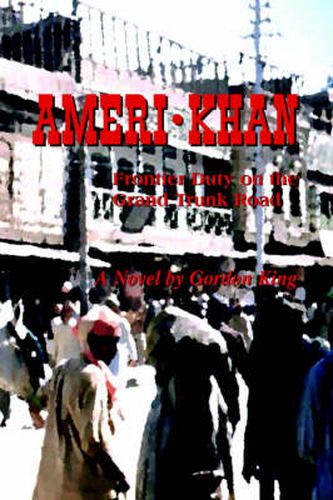Readings Newsletter
Become a Readings Member to make your shopping experience even easier.
Sign in or sign up for free!
You’re not far away from qualifying for FREE standard shipping within Australia
You’ve qualified for FREE standard shipping within Australia
The cart is loading…






This title is printed to order. This book may have been self-published. If so, we cannot guarantee the quality of the content. In the main most books will have gone through the editing process however some may not. We therefore suggest that you be aware of this before ordering this book. If in doubt check either the author or publisher’s details as we are unable to accept any returns unless they are faulty. Please contact us if you have any questions.
AMERI-KHAN: Frontier Duty on the Grand Trunk Road
A novel by Gordon King The book lays out in vivid fashion US diplomat David Booth’s assignment during the Eisenhower Presidency to open an American Consulate in Peshawar, Pakistan, pioneering an American diplomatic presence in the wild lawless area between the great Indus River and the border with Afghanistan. It included the fabled Khyber Pass, Baluchistan Province in the far south, and the majestic Himalayas in the far north, an area which for centuries had known only the law of the rifle and the rigors of tribal ways. The Grand Trunk Road, alive with legions of walkers and caravans, ended in Booth’s district, thousands of miles from its origin in Calcutta.
He made a home for his wife and children in Peshawar, opened an official American office, and hired a staff including an advisor who happened to be a member of the ruling family of a northern principality. The new office dealt with a myriad of cultural, bureaucratic and practical crises in the process of getting firmly established. (cont’d on back flap)
For example, an elderly American woman died in a local hotel–and her corpse was accidentally switched with that of a tribal Khan, creating a sensation among the Pushtun tribes. An American Colonel, in charge of a training detachment assigned to the Pakistan Army, turned pacifist with messy results. A church bazaar dissolved before a riot. Later, Booth spent five nightmare days in a hospital with bulbar malaria–5% recovery rate–before retreating to his prince advisor’s mountain home for a recovery.
After two years of further adventures and crises for David and his family, two young Americans from Missouri arrived on foot after endless months of trekking, determined to walk around the world. Despite David’s help and advice, the World Walkers managed to insult a local tribal Khan with the result that they were forced to make a quick guarded trek through tribal territory toward the Afghan border–a flight that provoked tragedy.
And resulted in David welcoming his transfer orders from Washington.
$9.00 standard shipping within Australia
FREE standard shipping within Australia for orders over $100.00
Express & International shipping calculated at checkout
This title is printed to order. This book may have been self-published. If so, we cannot guarantee the quality of the content. In the main most books will have gone through the editing process however some may not. We therefore suggest that you be aware of this before ordering this book. If in doubt check either the author or publisher’s details as we are unable to accept any returns unless they are faulty. Please contact us if you have any questions.
AMERI-KHAN: Frontier Duty on the Grand Trunk Road
A novel by Gordon King The book lays out in vivid fashion US diplomat David Booth’s assignment during the Eisenhower Presidency to open an American Consulate in Peshawar, Pakistan, pioneering an American diplomatic presence in the wild lawless area between the great Indus River and the border with Afghanistan. It included the fabled Khyber Pass, Baluchistan Province in the far south, and the majestic Himalayas in the far north, an area which for centuries had known only the law of the rifle and the rigors of tribal ways. The Grand Trunk Road, alive with legions of walkers and caravans, ended in Booth’s district, thousands of miles from its origin in Calcutta.
He made a home for his wife and children in Peshawar, opened an official American office, and hired a staff including an advisor who happened to be a member of the ruling family of a northern principality. The new office dealt with a myriad of cultural, bureaucratic and practical crises in the process of getting firmly established. (cont’d on back flap)
For example, an elderly American woman died in a local hotel–and her corpse was accidentally switched with that of a tribal Khan, creating a sensation among the Pushtun tribes. An American Colonel, in charge of a training detachment assigned to the Pakistan Army, turned pacifist with messy results. A church bazaar dissolved before a riot. Later, Booth spent five nightmare days in a hospital with bulbar malaria–5% recovery rate–before retreating to his prince advisor’s mountain home for a recovery.
After two years of further adventures and crises for David and his family, two young Americans from Missouri arrived on foot after endless months of trekking, determined to walk around the world. Despite David’s help and advice, the World Walkers managed to insult a local tribal Khan with the result that they were forced to make a quick guarded trek through tribal territory toward the Afghan border–a flight that provoked tragedy.
And resulted in David welcoming his transfer orders from Washington.